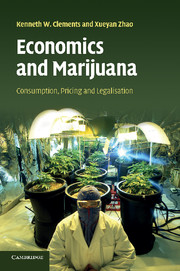Book contents
- Frontmatter
- Contents
- List of figures
- List of tables
- About the authors and contributor
- Acknowledgements
- 1 Introduction
- 2 Microeconometric evidence on marijuana consumption
- 3 The pricing of marijuana
- 4 More on the economic determinants of consumption
- 5 Decriminalising and legalising marijuana
- 6 Are Australians unique?
- 7 Perspectives
- Index
7 - Perspectives
Published online by Cambridge University Press: 19 January 2010
- Frontmatter
- Contents
- List of figures
- List of tables
- About the authors and contributor
- Acknowledgements
- 1 Introduction
- 2 Microeconometric evidence on marijuana consumption
- 3 The pricing of marijuana
- 4 More on the economic determinants of consumption
- 5 Decriminalising and legalising marijuana
- 6 Are Australians unique?
- 7 Perspectives
- Index
Summary
This book has dealt with the economic approach to drugs, that is, the application of economic principles to clarify the workings of drug markets. Three important aspects of this approach are as follows:
The analytical framework of rational addiction provided by Stigler and Becker (1977) and Becker and Murphy (1988). According to rational addiction, consumers exhibit forward-looking behaviour and trade off current benefits of using the addictive good today against its future costs. This framework clearly shows how conventional economic concepts apply to an addictive commodity.
Micro data on the usage of drugs by individuals. Large crosssectional databases are increasingly used to study the determinants of individuals' drug consumption.
Current experiments with decriminalising marijuana. The unintended consequences of prohibition of drugs, such as criminality, corruption, violence, disrespect for the law and uncertain product quality associated with underground markets, are now recognised as representing substantial costs. Are these costs more than those associated with the likely increased consumption that would accompany the legalisation of drugs? Although it is difficult to give a precise answer to this question, some countries (such as the US and Australia) are now trialling policies of reduced penalties for the possession of small amounts of marijuana.
This book has dealt with all three aspects. For example, in Chapter 1 we gave considerable prominence to the theory of rational addiction. In Australia, the Commonwealth government has carried out a number of waves of a large-scale, national survey of the usage of illicit drugs known as the National Drug Strategy Household Survey since the mid-1980s.
- Type
- Chapter
- Information
- Economics and MarijuanaConsumption, Pricing and Legalisation, pp. 406 - 417Publisher: Cambridge University PressPrint publication year: 2009

